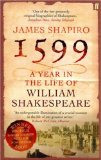
The Chandos portrait; read
about the Cobbe portrait
here and in the Guardian.

James Shapiro's
fascinating book
Shakespeare
'There's magic in the web of it' (Othello III.iv) - so here are some choice sites for Shakespeare surfers. Online editions are listed first - after all, 'The play's the thing.' Some of the text sites also contain valuable additional resources, so there is some overlap between these lists.
Finding the texts
As well as the usual sources of online texts, such as Project Gutenberg, there are a number of sites dedicated to Shakespeare:- Project Bartleby: The Oxford Shakespeare editions of the plays divided by scene.
- Electronic Text Centre: Shakespeare Resources from the University of Virginia, including early Quartos, the complete 1623 First Folio and early playhouse promptbooks as well as more modern editions and to many bibliographical articles that discuss Shakespeare's works.
- Online Books Page at the University of Pennsylvania: useful quick links to editions on a number of sites.
- Oxford Text Archive: an archive for the 'worldwide academic community', aiming to provide accurate digital editions. Searching for a word produces a corpus-like list, for example. Access is free though you may be asked for your email address before you download.
- Internet Shakespeare Editions: includes old-spelling texts of the plays.
- The IPL Shakespeare Bookshelf: an easy to use online source for the plays.
- Open Source Shakespeare: includes the 1866 Globe Edition of the complete works, powerful search facilities, a concordance and the text of all the plays. These are searchable in a variety of ways which can reveal surprising patterns of meaning.
- No Sweat Shakespeare: modern language Shakespeare translations and resources.
Shakespeare websites
- Absolute Shakespeare - describes itself as 'the essential resource for William Shakespeare's plays, sonnets, poems, quotes [sic], biography and the legendary Globe Theatre'. Useful for quick access to the texts.
- Internet Shakespeare Editions: as well as texts of the plays this site has many other useful resources for students and teachers.
- Folger Shakespeare Library: large collection of Shakespeare materials with attractive and informative web resources.
- Mr William Shakespeare and the Internet: a range of useful resources and background material, including a guide to more online Shakespeare sites.
- Screenonline this growing resource from the BFI has a section on Shakespeare on Film, including clips, resources, etc. The quickest way is to go to the Do it yourself section and then locate the 'English - Shakespeare' resources. Free, but access is restricted to schools and colleges.
- Shakespeare Birthplace Trust: useful not only for information about the buildings it owns in and around Stratford-on-Avon but also for information about Shakespeare.
- Shakespeare's Globe Theatre: productions, booking and a very useful Globe Education section. Take a look too at:
- Playing Shakespeare: a website exploring Macbeth, Romeo and Juliet and Much Ado About Nothing with the help of actors from Shakespeare's Globe.
- Shakespeare's World from Emory University includes Shakespeare Illustrated: nineteenth-century paintings, criticism and productions.
- No Sweat Shakespeare: modern language Shakespeare translations and resources.
- Royal Shakespeare Company: performance schedules and booking information as well as online play guides, material from the archives and more.
- Shakespeare High - including Surfing with the Bard: Amy Ulen's site provides rich and lively resources, including recommended reading, a classroom area for students, a "faculty lounge" for teachers, a Performing Arts Center and a discussion area.
Books on Shakespeare
These books are likely to be useful in the first instance for AS and A Level teachers - students could be directed to suitable sections:- Jonathan Bate: The Genius of Shakespeare, Picador. This readable modern survey, including Shakespeare's life and a survey of responses to his work over time, should be in every library.
- James Shapiro: 1599: A Year in the Life of William Shakespeare: fascinating account of the year the Globe was built, Shakespeare completed Henry V, Julius Caesar and As You Like It and drafted Hamlet.
- Bill Bryson: Shakespeare: The World as a Stage: a likeable condensed biography
- Frank Kermode: Shakespeare's Language, Penguin
- Fintan O'Toole: Shakespeare is Hard, but so is Life - Granta. Short, provocative and fun to read.
- Kiernan Ryan (ed): Shakespeare: Texts and Contexts
, Palgrave Macmillan (Open University). Interesting essays on aspects of interpretation, with chapters on A Midsummer Night's Dream, Richard II, Macbeth, Antony and Cleopatra, Hamlet, Twelfth Night, Measure for Measure, King Lear and The Tempest.
- Routledge Guides to Literature
: this new series is similar in intent to the long established Casebook series but is probably more accessible to A Level students, with its signposted layout and extracts from key passages. The volume on Hamlet
includes critical essays up to 2002 as well as a useful section on the play in performance on stage and on film.

